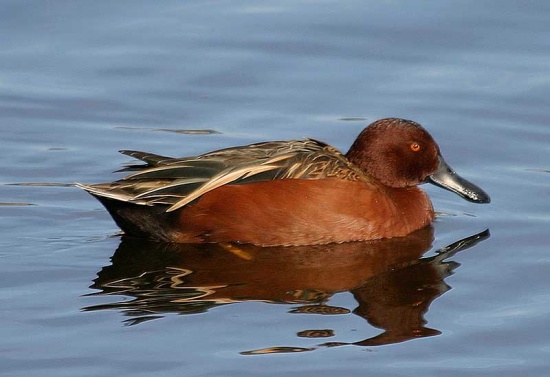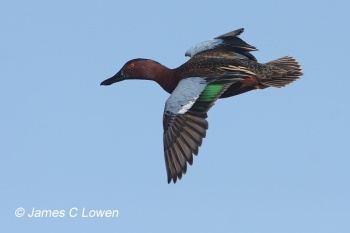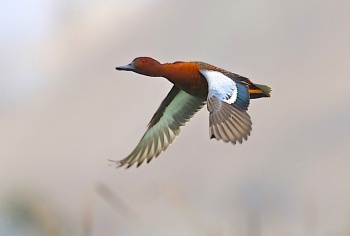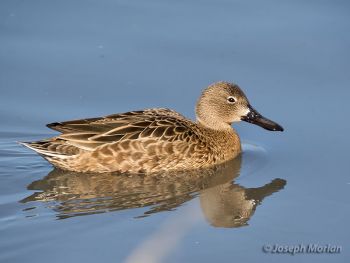NaturePete (talk | contribs) |
Sbarnhardt (talk | contribs) (Added Clearer Image for female - jmorlan) |
||
| (9 intermediate revisions by 5 users not shown) | |||
| Line 1: | Line 1: | ||
| − | + | [[Image:Cinnamon_Teal.jpg|thumb|550px|right|Adult male<br />Photo © by {{user|Fulmar|Fulmar}}<br/>Upper Newport Bay, Newport Beach, Orange County, [[California]], [[USA]], 8 February 2004]] | |
| − | + | ;[[:Category:Spatula|Spatula]] cyanoptera | |
| − | [[Image:Cinnamon_Teal.jpg|thumb|550px|right| | ||
| − | |||
==Identification== | ==Identification== | ||
| − | + | [[File:Cinnamon_Teal_Female_JM.jpg|thumb|350px|right|Female<br />Photo © by {{user|jmorlan|Joseph Morlan}}<br />Fremont, [[California]], [[USA]], 30 November 2020]] | |
| − | + | 35–48 cm (13¾-19 in); a small dabbling duck<br /> | |
| + | '''Adult Male''' | ||
*Cinnamon-red head and body | *Cinnamon-red head and body | ||
*Brown back | *Brown back | ||
*Red eye | *Red eye | ||
| − | *Dark bill | + | *Dark bill<br /> |
| − | + | ||
| + | '''Adult Female''' | ||
*Mottled brown body | *Mottled brown body | ||
*Pale brown head | *Pale brown head | ||
| Line 18: | Line 18: | ||
Female very similar to female [[Blue-winged Teal]] | Female very similar to female [[Blue-winged Teal]] | ||
==Distribution== | ==Distribution== | ||
| − | Western North and South America. They are migratory and most winter in Central and South America, generally not migrating as far as the Blue-winged Teal. | + | Western [[North America|North]] and [[South America]]. They are migratory and most winter in [[Central America|Central]] and South America, generally not migrating as far as the Blue-winged Teal. |
| + | |||
| + | Occurs as vagrants in the [[Caribbean]]. | ||
| + | |||
| + | ==Taxonomy== | ||
| + | Formerly placed in the genus ''[[:Category:Anas|Anas]]''. | ||
| + | [[Image:Cinnamon Teal Lowen.jpg|thumb|350px|right|Male, subspecies ''cyanoptera''; Argentine Cinnamon Teal<br />Photo © by {{user|JCL|James C. Lowen}}<br />Bahia Blanca, Buenos Aires, [[Argentina]], September 2009]] | ||
| + | ====Subspecies==== | ||
| + | There are 5 subspecies<sup>[[#References|1]]</sup>: | ||
| + | *''S. c. septentrionalium'': (Northern Cinnamon Teal) | ||
| + | :*[[British Columbia]] to north-western [[Mexico]]; winters to north-western [[South America]] | ||
| + | *''S. c. tropica'': (Tropical Cinnamon Teal) | ||
| + | :*Cauca and Magdalena valleys of [[Colombia]] | ||
| + | *''S. c. borreroi'': (Borrero's Cinnamon Teal); possibly extinct | ||
| + | :*Eastern Andes of Colombia | ||
| + | *''S. c. orinoma'': Andean Cinnamon Teal | ||
| + | :*Altiplano of [[Peru]] and [[Bolivia]] to northern [[Chile]] | ||
| + | *''S. c. cyanoptera'': Argentine Cinnamon Teal | ||
| + | :*Southern Peru and southern [[Brazil]] to Tierra del Fuego and [[Falkland Islands]] | ||
| + | [[Image:Cinnamon Teal drake .jpg|thumb|350px|right|Male, subspecies ''orinoma''; Andean Cinnamon Teal<br />Photo © by {{user|Stanley+Jones|Stanley Jones}}<br />Los Pantanos de Villa Refuge, Chorrillos, Lima, [[Peru]], 31 August 2017 ]] | ||
==Habitat== | ==Habitat== | ||
| − | + | They use both fresh water and brackish marshes and ponds with plenty of emergent plants and vegetation around the edges, like cattails and bulrushes. | |
| − | + | ==Behaviour== | |
| − | == | ||
====Breeding==== | ====Breeding==== | ||
Generally select new mates each year. | Generally select new mates each year. | ||
====Diet==== | ====Diet==== | ||
| − | + | Dabbling ducks, the most important part of their diet is the seeds and roots of aquatic plants, but they also eat molluscs and aquatic insects. | |
| − | == | + | ==References== |
| − | + | #{{Ref-Clements6thAug18}}#Carboneras, C., Christie, D.A. & Kirwan, G.M. (2017). Cinnamon Teal (''Spatula cyanoptera''). In: del Hoyo, J., Elliott, A., Sargatal, J., Christie, D.A. & de Juana, E. (eds.). Handbook of the Birds of the World Alive. Lynx Edicions, Barcelona. (retrieved from http://www.hbw.com/node/52892 on 19 April 2017). | |
| − | + | #Gammonley, James H.. (2012). Cinnamon Teal (''Anas cyanoptera''), The Birds of North America (P. G. Rodewald, Ed.). Ithaca: Cornell Lab of Ornithology; Retrieved from the Birds of North America: https://birdsna.org/Species-Account/bna/species/cintea | |
| − | + | #Johnson, K. P. and M. D. Sorenson. 1999. Phylogeny and biogeography of dabbling ducks (genus: ''Anas''): A comparison of molecular and morphological evidence. Auk 116 (3):792-805. | |
| − | + | #BF Member observations | |
| + | #Wikipedia contributors. (2018, November 24). Cinnamon teal. In Wikipedia, The Free Encyclopedia. Retrieved 10:47, December 4, 2018, from https://en.wikipedia.org/w/index.php?title=Cinnamon_teal&oldid=870390230 | ||
| + | {{ref}} | ||
==External Links== | ==External Links== | ||
| − | {{GSearch| | + | {{GSearch|Cinnamon+cyanoptera}} |
| − | [[Category:Birds]] | + | [[Category:Birds]][[Category:Spatula]] |
Latest revision as of 17:54, 18 February 2021

Photo © by Fulmar
Upper Newport Bay, Newport Beach, Orange County, California, USA, 8 February 2004
- Spatula cyanoptera
Identification
35–48 cm (13¾-19 in); a small dabbling duck
Adult Male
- Cinnamon-red head and body
- Brown back
- Red eye
- Dark bill
Adult Female
- Mottled brown body
- Pale brown head
- Brown eyes
- Grey bill
Similar Species
Female very similar to female Blue-winged Teal
Distribution
Western North and South America. They are migratory and most winter in Central and South America, generally not migrating as far as the Blue-winged Teal.
Occurs as vagrants in the Caribbean.
Taxonomy
Formerly placed in the genus Anas.

Photo © by James C. Lowen
Bahia Blanca, Buenos Aires, Argentina, September 2009
Subspecies
There are 5 subspecies1:
- S. c. septentrionalium: (Northern Cinnamon Teal)
- British Columbia to north-western Mexico; winters to north-western South America
- S. c. tropica: (Tropical Cinnamon Teal)
- Cauca and Magdalena valleys of Colombia
- S. c. borreroi: (Borrero's Cinnamon Teal); possibly extinct
- Eastern Andes of Colombia
- S. c. orinoma: Andean Cinnamon Teal
- S. c. cyanoptera: Argentine Cinnamon Teal
- Southern Peru and southern Brazil to Tierra del Fuego and Falkland Islands

Photo © by Stanley Jones
Los Pantanos de Villa Refuge, Chorrillos, Lima, Peru, 31 August 2017
Habitat
They use both fresh water and brackish marshes and ponds with plenty of emergent plants and vegetation around the edges, like cattails and bulrushes.
Behaviour
Breeding
Generally select new mates each year.
Diet
Dabbling ducks, the most important part of their diet is the seeds and roots of aquatic plants, but they also eat molluscs and aquatic insects.
References
- Clements, J. F., T. S. Schulenberg, M. J. Iliff, D. Roberson, T. A. Fredericks, B. L. Sullivan, and C. L. Wood. 2018. The eBird/Clements checklist of birds of the world: v2018. Downloaded from http://www.birds.cornell.edu/clementschecklist/download/
- Carboneras, C., Christie, D.A. & Kirwan, G.M. (2017). Cinnamon Teal (Spatula cyanoptera). In: del Hoyo, J., Elliott, A., Sargatal, J., Christie, D.A. & de Juana, E. (eds.). Handbook of the Birds of the World Alive. Lynx Edicions, Barcelona. (retrieved from http://www.hbw.com/node/52892 on 19 April 2017).
- Gammonley, James H.. (2012). Cinnamon Teal (Anas cyanoptera), The Birds of North America (P. G. Rodewald, Ed.). Ithaca: Cornell Lab of Ornithology; Retrieved from the Birds of North America: https://birdsna.org/Species-Account/bna/species/cintea
- Johnson, K. P. and M. D. Sorenson. 1999. Phylogeny and biogeography of dabbling ducks (genus: Anas): A comparison of molecular and morphological evidence. Auk 116 (3):792-805.
- BF Member observations
- Wikipedia contributors. (2018, November 24). Cinnamon teal. In Wikipedia, The Free Encyclopedia. Retrieved 10:47, December 4, 2018, from https://en.wikipedia.org/w/index.php?title=Cinnamon_teal&oldid=870390230
Recommended Citation
- BirdForum Opus contributors. (2024) Cinnamon Teal. In: BirdForum, the forum for wild birds and birding. Retrieved 6 May 2024 from https://www.birdforum.net/opus/Cinnamon_Teal




